News that Rima Fakih, 24, of Dearborn, Michigan, won the Miss USA beauty pageant today prompts me to recall some prior instances of Muslim women winning beauty contests in Western countries.
 Rima Fakih . |
Keriman Halis Ece, a Turk, was Miss Universe in 1932.
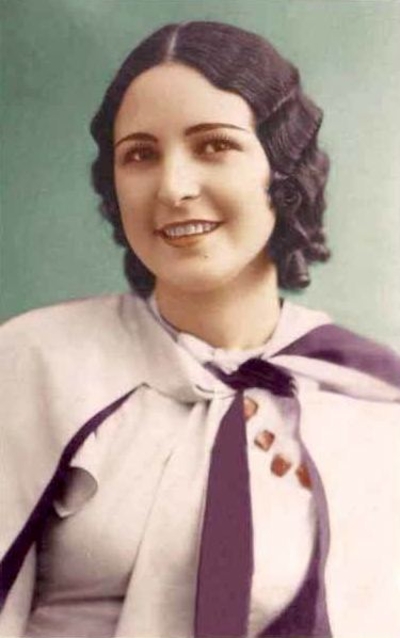 Keriman Halis Ece. |
Juliette Boubaaya, 19, was Miss Picardie in 2009.
 Julliette Boubaaya. |
Nora Ali was America's Junior Miss in 2007.
 Nora Ali. |
Hammasa Kohistani, 19, was Miss England in 2006.
 Hammasa Kohistani. |
Sarah Mendly, 23, was Miss Nottingham in 2005.
 Sarah Mendly. |
They are all attractive, but this surprising frequency of Muslims winning beauty pageants makes me suspect an odd form of affirmative action.
My suspicion is borne out by the selection of Anisah Rasheed as Miss A&T at North Carolina Agricultural and Technical State University. From the news report about her success:
Excited and jittery, Anisah Rasheed of Roanoke pondered a fashion dilemma that few beauty queens have faced before: Matching her coronation gown with her hijab. ... Rasheed, 20, was crowned Miss A&T for 2005-06 on Thursday night in a sparkling fishtail gown—with a tiara glittering over her golden hijab—during homecoming ceremonies at North Carolina A&T State University.
 Anisah Rasheed. |
May 17, 2010 update: Several readers have written in response to this blog. One notes that, on a more serious level, affirmative action appears to play a role in some of the Nobel Prizes.
A second reader reminds me of the adventurous career of Georgina Rizk (b. 1953), Lebanon's first and only Miss Universe.
Rizk was born in Beirut to a Christian household. She was crowned in the Miss Universe pageant in 1971 in Miami Beach, Florida. ... In the pageant she made a memorable fashion statement by wearing a very revealing top and hotpants. Georgina was married to Ali Hassan Salameh, a Palestinian national with Black September, who was assassinated in 1979 by the Mossad.
In the 1972 Miss Universe pageant in Dorado, Puerto Rico, Rizk was not allowed to attend due to government restrictions because of fears of a terrorist attack. These fears were triggered when, two months prior to the pageant, bombings occurred outside the hotel in which Miss USA was then staying. Lebanon also did not send a delegate to the pageant that year.
 Georgina Rizk. |
A third writes:
No surprise here. Affirmative action was first applied in beauty contests for black women to win in the 1980s, then it was the turn of Latin, brown skinned women, and now it's Muslims. That's why most people ignore these rigged "events." They are money losers and require controversy.
A fourth reminds me of the terrible loss of life and destruction of property in 2002 when a light-hearted comment by Nigerian fashion journalist Isioma Daniel on the occasion of the Miss World contest led to violent riots caused by Islamists that led to over 200 deaths, 1,000 injured persons, and some 11,000 rendered homeless.
May 17, 2010 update bis: This little blog has set off a thunderstorm on the left, with dozens of surly and hostile comments attacking me for raising the question posed about affirmative action in beauty pageants. Somebody doth protest too much.
From the day's rich panoply of nastiness, I'll focus on one response in particular, by Benjamin Sarlin in the unfortunately-named Daily Beast website. On the one hand, Sarlin typifies the extravagance of my critics:
A number of conservative bloggers, including Daniel Pipes, a Bush appointee to the U.S. Institute of Peace and adviser to Rudy Giuliani's 2008 presidential campaign, are slamming the Miss USA organization for rigging the contest in the name of political correctness.
USIP? Giuliani? Slamming? Rigging? Dear Reader: Review my sparse commentary above and show me, please, what justifies this barrage. Why can't my critics disagree without exaggerating to the point of distortion? And Sarlin is hardly the most egregious of today's hurrumphers and hystericals.
I quoted Sarlin because, to his credit, he alone did some actual reporting:
A spokeswoman for the Miss USA competition, Lark-Marie Anton, told The Daily Beast that Fakih's critics were way off base and the contest was conducted fairly. "The panel of judges selected Rima as the winner," Anton said in an email. "I don't believe this has anything to do with affirmative action and I am saddened by the ignorance surrounding her multicultural heritage."
And what should a Miss USA representative say – acknowledge that the judges did favor an Arab-Muslim candidate? Hardly. Still, it amuses me that Lark-Marie Anton seems to accuse me of "ignorance surrounding her multicultural heritage." What have I been doing these past 41 years but studying that "multicultural heritage"? What has Lark-Marie Anton been doing?
May 18, 2010 update: Given the storm over this little post, a few more clarifications and additional bits of information are in order:
Implicit to my musing about affirmative action is that very few Muslim women enter Western beauty pageants. (And of those few, some are muscled out of the competition.) Given the temper of the times and the wish to bring Muslims into the mainstream of Western life, judges might well favor the Muslim contestants as a matter of good will and social policy.
There are worse things in the world than such favoritism. I did not condemn it, I merely noted it. At the same time, I do think it worth noting that the playing field is tilted to help some players – what I did.
Islamist beauty pageants, of course, also exist. The Times (London) describes one in May 2009: "As of tomorrow 200 veiled hopefuls will start a ten-week process to find the winner of 'Miss Beautiful Morals'." No men have any role in this event. The founder of the pageant, for women aged 15 to 25 and offering a $2,600 prize, explains that she intends it to measure "the contestants' commitment to Islamic morals . . . It's an alternative to the calls for decadence in the other beauty contests that only take into account a woman's body and looks." She explains that "The winner won't necessarily be pretty. We care about the beauty of the soul and the morals."
- Aylin Kösetürk, 16, is Austria's Top Model in 2010

Aylin Kösetürk.
Shermine Shahrivar, 23, was Miss Europe in 2005.

Shermine Shahrivar.
Nazanin Afshin-Jam, 24, a Christian born in Iran, was Miss World Canada in 2003 and #1 runnerup to the Miss World contest.
Nazanin Afshin-Jam.
Rana Raslan, 22, was Miss Israel in 1999.

Rana Raslan.
May 18, 2010 update bis: Changing subjects slightly, I read with interest a publication of the U.S. State Department intended for foreign consumption that Fakih received financial support from Imad Hamad, Michigan director for the American-Arab Anti-Discrimination Committee (ADC). The exact report:
"For Arab Americans, it [her victory] carries a special meaning because for the past several years we have faced many challenges," Hamad told America.gov. "But this just shows how an immigrant, who came from Lebanon, can be an ambassador from America to the world at just 24 years old." Hamad said his organization once financially supported Fakih's pageant aspirations. "I always felt she has something to offer and was sure she would follow her passion and her dreams," Hamad said. "I was right."
NB: "his organization once financially supported Fakih's pageant aspirations."
That an organization ostensibly devoted to civil rights would promote a beauty pateant contestant is odd enough; but that Hamad – whose record includes demanding that Islamic holidays be celebrated in public schools, opposing sensible airport security measures, mourning the capture of Saddam Hussein, and calling Hizbullah terrorists "heroes" – supports Fakih raises concerns about her own political outlook. Too bad the judges did not ask her about Hizbullah during the pageant.
May 21, 2010 update: Lee Smith takes up the really interesting cultural question surrounding Rima Fakih – not whether the judges were biased in her favor, but "Is Rima Fakih a Westernized Muslim just because she wore a bathing suit? Not necessarily." He explains his reasoning:
a Muslim woman's willingness to show off her flesh is no more a triumph for modernity and moderation than the veil is an index of extremism. For instance, one of Lebanon's most popular divas, Haifa Wehbe—a woman whose music videos would make most Michigan strippers blush—has also professed her admiration for Hizbullah.
Smith goes on to generalize:
a bikini alone, or even a ball gown, doesn't necessarily say anything meaningful about the person wearing it. That goes, too, for places of birth, jobs, and a raft of other lifestyle issues: they don't necessarily say anything about people. Rather, it's what's on the inside that counts. It is peculiar, then, that Americans so often forget this lesson when it comes to how they think about Muslim communities and regularly confuse external form for internal content.
He then zeroes in on one of the Obama administration's greatest embarrassments, John Brennan, who keeps making precisely this mistake:
Consider, for instance, the recent statements of the White House's counterterrorism czar, who sees in Hizbullah a terrorist organization that, because its members are doctors and lawyers and parliamentarians, really wants to become a partner for Middle East peace. Hizbullah's hardliners, Brennan said this week at a Washington conference, "are truly a concern to us, what they're doing. What we need to do is to find ways to diminish their influence within the organization and to try to build up the more moderate elements." ... This is a repeat of last year when ... Brennan laid out his strange reasoning at another Washington meeting. "Hizbullah started out as purely a terrorist organization back in the early '80s and has evolved significantly over time," said Brennan. "Now it has members of Parliament, in the cabinet; there are lawyers, doctors, others who are part of the Hizbullah organization."
That is to say, people with mainstream jobs are moderate—an extremely facile analysis. Being moderate means advocating moderate ideas, but these doctors and lawyers and parliamentarians don't seek peace with Israel. They don't regret killing 241 U.S. servicemen in the 1983 Marine barracks bombing in Beirut. They won't stop threatening their countrymen, nor will they surrender their weapons and become a regular Lebanese political party. In fact, no member of Hizbullah has ever publicly advanced a position any different from those of the so-called hardliners. It appears that they are moderate simply because of their careers.
Smith places Brennan's mis-analysis in context:
Brennan's view about the ostensible "moderation" of Hizbullah is the culmination of a three-decade-long academic trend that has interpreted this Lebanese terrorist outfit not by looking at it for what it is, but by looking in the mirror, one that reflects our Western images back to us. We Americans may not know sheiks and mullahs and ayatollahs, but we know doctors and lawyers. Given the professional code of ethics required of those who pursue these Western-style careers, they must, by definition, be moderate, like our doctors and lawyers, congressmen and cabinet secretaries.
And he concludes by explaining how it is that modern-appearing Muslims can harbor Islamist views:
for the last century Muslims have been arguing whether it is best to accept or to reject the cultural values that accompany modernity, values most Muslims associated with the West. Liberals contended that it was impossible to have modernity without the values that had created it, while conservatives argued that Muslims must maintain their own values even as they embraced the science and technological goods that the West had on offer. ...
Scholars, like the mufti of Egypt Muhammad Abduh, counseled Muslims to make use of the West's scientific advances but to shun Western values so that they did not lose their faith. And so throughout the 19th and 20th centuries, Muslims availed themselves of the fruits of Western technology—from military hardware to home electronics—while disdaining the values they associated with the West. (Because it was precisely those cultural values that had led to the West's ability to create such goods, the Muslim world became merely consumers. What Abduh and the conservatives had wanted to separate—science from the cultural values that produced science—cannot be split.)
But that is why some Muslim doctors and lawyers can enjoy the outward trappings of modernity—and, in some cases, even live in the West—but still harbor fundamentalist ideas. The notion of a doctor directing terrorist operations seems to us, rightly, incongruous. But this ghastly combination is the end result of a 100-year-old ideological trend that told Muslims to distinguish the products, comforts, and pursuits of Western progress and technology from the values that made them possible.
Smith offers an excellent analysis about a subtle and very important point. (I'd only change one small thing he wrote – that this debate has been going on for two centuries, not one.) In sum, behavior and political outlook are two very different and sometimes opposed phenomena.
May 23, 2010 update: Fakih has replied to me, telling the Sunday Times (London), "If I had lost, people would have said, oh, it's because you are a Muslim. It's funny, because now they are saying instead, oh, it's because you are a Muslim that you won."
Comment: She is right, though those who would have said the former differ from those who are saying the latter. More basically, she is pointing to the unarguable fact that the presence of Muslims in Western life arouses contention. In contrast, think of the millions of Hindus living in the West and how little attention they garner.
May 27, 2010 update: In what appears to be the first in-depth interview with Fakih since her Miss USA victory, David Charles of Patheos uncovers someone who on the one hand describes herself as "a respectful, liberal Muslim" and who approves of the good life and of her religiously mixed family, but on the other hand has this dismayingly apologetic view of 9/11: "I never understood the whole speculation around 9/11. It involved someone who was not [Muslim]. They might have believed, in their wrong minds, that they were Muslim even though they were completely doing everything against the Muslim faith."
June 11, 2010 update: Alisar Ailabouni, 21, of Syrian origins, Muslim religion, and Austrian nationality, today became Germany's Top Model. Of note: in February, a Turkish Muslim became Austria's Top Model (see the May 18, 2010 update, above).
 Alisar Ailabouni. |
Nov. 11, 2011, update: Huda Naccache, a Christian Arab from Haifa, represented Israel to the Miss Earth beauty pageant.
 Huda Naccache. |
Feb. 1, 2012 update: Sara Chafak, 21, of Moroccan origins, Muslim religion, and Finnish nationality, yesterday became Finland's Miss Finland 2012.
 Sara Chafak. |
Feb. 13, 2013 update: For a look at Islamist fashion design on the catwalk at New York Fashion Week, see the pictures in the Daily Mail article on this topic. I provide just the first one here, as a foretaste.
 The Daily Mail caption: "Modest modelling: Nailah Lymus, a practicing Muslim and designer who produced a show for New York Fashion Week on Saturday, aims to bring together secular fashion and the sanctity of Islamic customs." |
Nov. 1, 2015 update: She's not your usual beauty contestant: Miriam Shaded is a pro-Christian activist partly of Syrian origins born in Poland. She was expelled from the Miss Egzotica (Miss Exotic) pageant because the organizers did not approve of her politics.
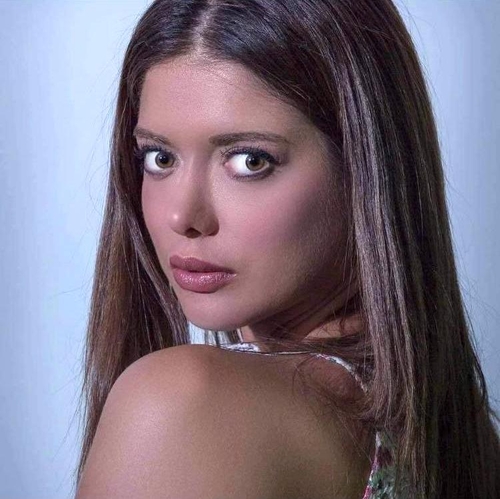 Miriam Shaded. |
May 3, 2016 update: Rima Fakih, whose crowning as Miss America in 2010 inspired this weblog entry, has converted to Christianity to marry Wassim Salibi.
May 13, 2017 update: A Muslim, Muna Juma, 27, won the right to take part in the Miss Universe Great Britain beauty pageant wearing a kaftan instead of a bikini. July 18, 2017 update: Here she is, in kaftan.
 Muna Juma in kaftan, not bikini. |
July 14, 2017 update: Esma Voloder is the new Miss World-Australia 2017. Prior crowns include Miss Teen Australia 2008, World Supermodel 2009, and Miss Globe International 2014.
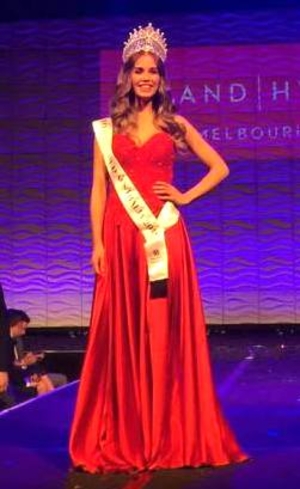 Esma Voloder. |
Sep. 3, 2018 update: Sara Iftekhar, 20, holds the Miss Huddersfield and Miss Yorkshire Popularity titles and is soon to compete in the Miss England contest.
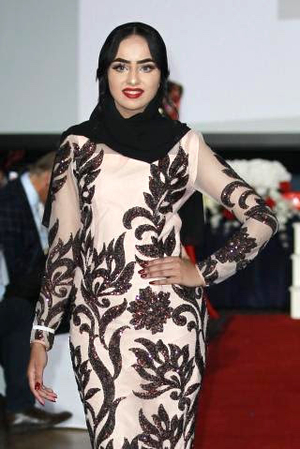 Sara Iftekhar in a Pakistani-style outfit. |
Nov. 27, 2018 update: Not a beauty queen but a model of "modest fashion" in the German version of Vogue magazine.
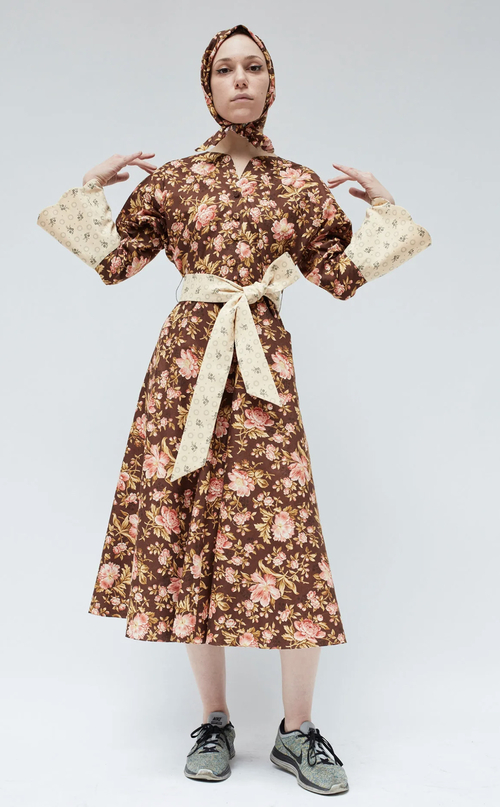 German Vogue identifies this as "Batsheva AW18." |
July 18, 2019 update: As though intent on confirming my suspicion about politically-correct bias in beauty contests, the Miss World America management stripped Kathy Zhu, a conservative commentator, of her Miss Michigan title. She explains why: "They stripped me of my Miss Michigan title due to my refusal to try on a hijab in 2018, my tweet about black on black gun violence, and 'insensitive' statistical tweets."
 Kathy Zhu, before her Miss Michigan title was taken away. |
Of particular interest is the incident in which Zhu refused to allow a hijab to be put on her head during an event on campus. Zhu explains her reasoning:
what is "insensitive" is that women in the Middle East are getting STONED TO DEATH for refusing to obey their husband's orders to wear hijabs. A Muslim woman tried to FORCIBLY put a hijab on my head without my permission. I tweeted about it on my social media, and it got the attention of the media. Almost everyone was supportive of me refusing to be put in that situation.
Zhu commented on the title being taken from her:
I am completely disheartened by this situation. I was so excited to represent the state of Michigan and advocate for "don't be afraid to speak your truth" as my main statement. For them to take my title away due to right-leaning tweets shows that they only want pageant girls to have brainless statements like "world peace" and not meaningful ideals that would actually make a difference.
Aug. 22, 2019 update: More confirmation about the political nature of beauty contests comes from Ms Nevada, Katie Williams, who alleges that she was booted from the Ms America contest because of her pro-Trump views.
Dec. 12, 2019 update: Amaani Noor, 21, was once a "Miss Teen GB" semi-finalist; now she has been found guilty of funding Islamist terrorism via an organization called The Merciful Hands.
 Amaani Noor once took part in beauty contests; now she's likely off to jail. |
July 4, 2020 update: For a report on the Miss Muslimah USA pageant in Dearborn, Michigan, see the puff-piece by Liana Aghajanian in today's New York Times.
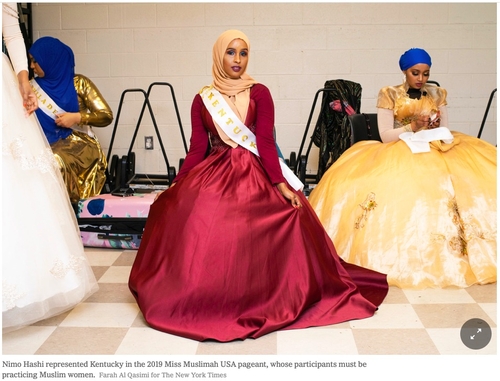 Caption: "Nimo Hashi represented Kentucky in the 2019 Miss Muslimah USA pageant, whose participants must be practicing Muslim women.Credit...Farah Al Qasimi for The New York Times" |
Jan. 22, 2021 update: For another arena where Islamists demand (and win?) special treatment, see Abigail R. Esman, "When Conservative Islam and Fashion Collide," IPT News. Here's what set things off:
Muslim model Halima Aden, who broke barriers by being the first supermodel to wear hijab and, later, to pose in a burkini for Sports Illustrated, ha[s] decided to end her blossoming career. The fashion industry, she said, had failed to accommodate her needs; and joining a chorus of other Muslim women in the field, she called on designers, fashion editors, and others to remake themselves to fulfill the demands of Muslim (read: hijabi) women.
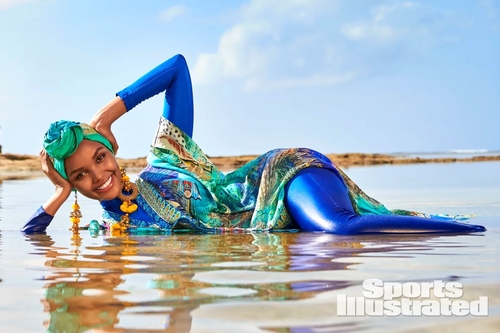 Halima Aden in Sports Illustrated. |
Dec. 21, 2021 update: Eighteen-year-old Shatu Garko has been crowned the Miss Nigeria beauty pageant, the 44th winner and the first hijabi.
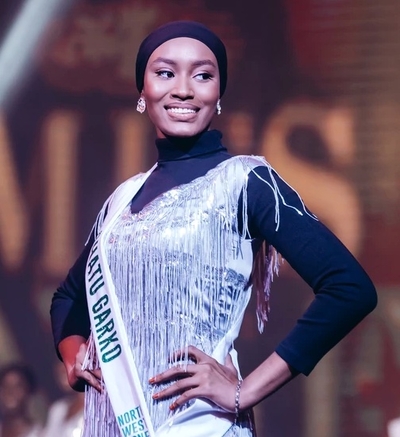 Shatu Garko. |
July 2, 2022 update: Katrina Kincade is the first Muslim woman to win the title of Miss Massachusetts.
 Katrina Kincade won the Miss Massachusetts title. |
Mar. 10, 2024 update: Apameh Schönauer, a 39-year-old mother born in Iran, won the Miss Germany title after the organizers loosened the age restriction and declared the pageant not so much a beauty contest as "an award for women who take responsibility."
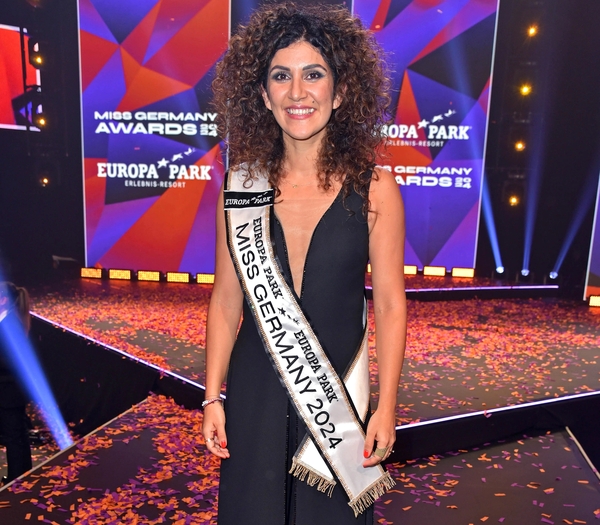 Apameh Schönauer. |
Aug. 26, 2025 update: Miss Palestine brings a whole new level of weirdness to beauty pageants. The New York Post explains:
A contestant in this year's Miss Universe pageant will represent a country most nations don't recognize, for a religious culture that rejects her, after winning a competition that apparently didn't happen.
Miss Palestine will compete in the pageant for the first time ever in November — represented by Nadeen Ayoub, 27, who is also listed as founder and manager of the Miss Palestine Organization, the group behind her title.
The Post could not find any record of a Miss Palestine pageant having been held, the names of any other contestants, or ways for them to have registered to compete.
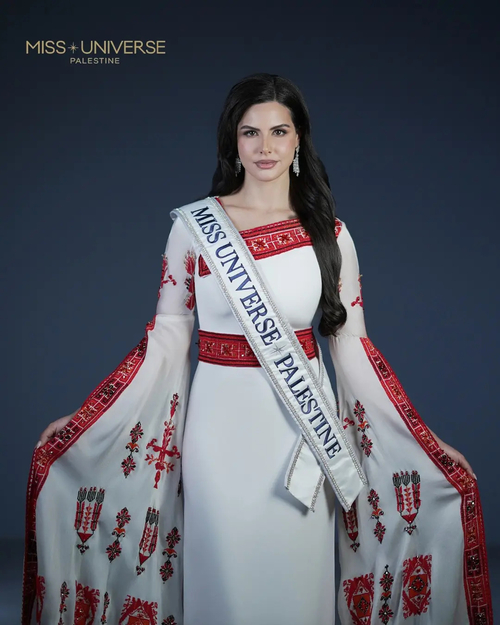 Nadeen Ayoub, a Canadian in Dubai who appointed herself "Miss Palestine." |
Sep. 17, 2025 update: Another Miss Universe issue, this time in Mexico, where Fátima Bosch won the title but 27 of the other 31 contestants rejected her victory, refusing to give her the customary hug, instead supporting the runner-up, Yoana Gutiérrez who represented the state of Jalisco, chanting, "Jalisco won!" In addition, some in the live audience booed Bosch. Footage of the incident went viral on social media.
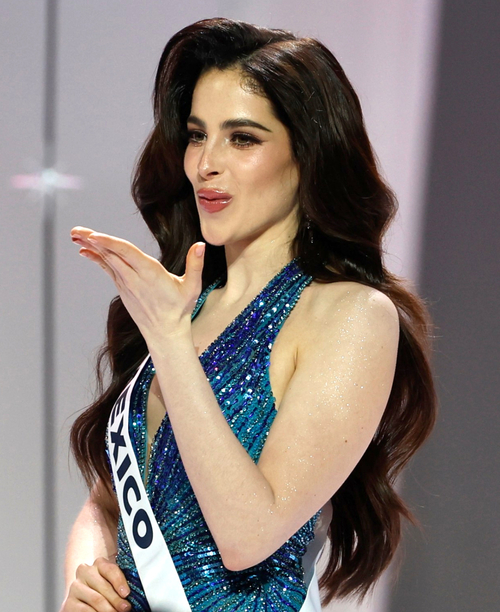 Fatima Bosch, representing Mexico in Thailand in November 2025. |
Nov. 21, 2025 update: Bosch won the Miss Universe pageant.
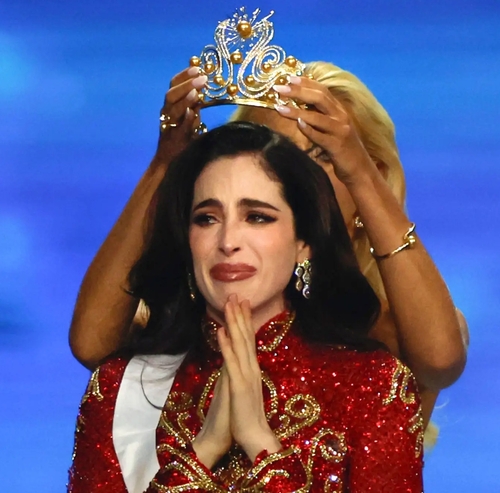 Fátima Bosch crowned as Miss Universe 2025 by Victoria Kjær Theilvig, Miss Universe 2024. |
Nov. 25, 2025 update: Not just affirmative action but also vote-rigging? That's what Nadeen Ayoub, so-called Miss Palestine alleges:
I was leading in the voting category on the Miss Universe app for the most beautiful people and it was the only category on the application that didn't close and they didn't award anyone out of all of the other categories, even though the competition was over. I was leading by far, and we only had maybe 30 minutes until the voting closes.
Within two minutes, another contestant went up over 20,000 votes, which is very impossible to do—unless there's more than one person voting, and it's not really realistic unless it's done internally. I just find that this is very injustice [sic].
Anyways, the voting just closed but I really had to say something. I have to stand up for myself just like I stand up for other people. As a Palestinian woman, I will stand up for what's right.

